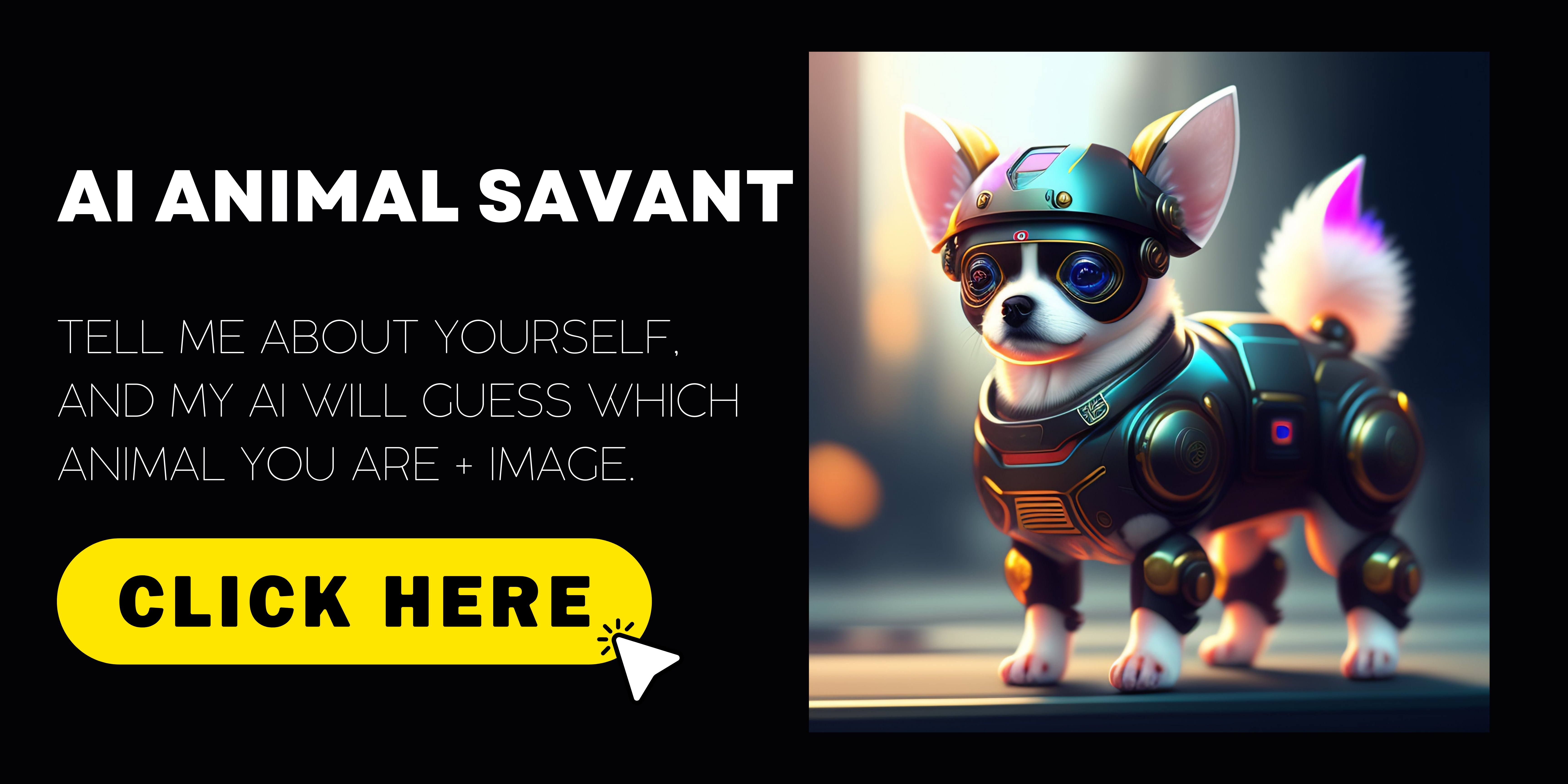The short answer is yes. Huskies can eat bones. Many dog owners report that their huskies love to chew on bones. However, if you’re considering giving your husky a bone to chew on.
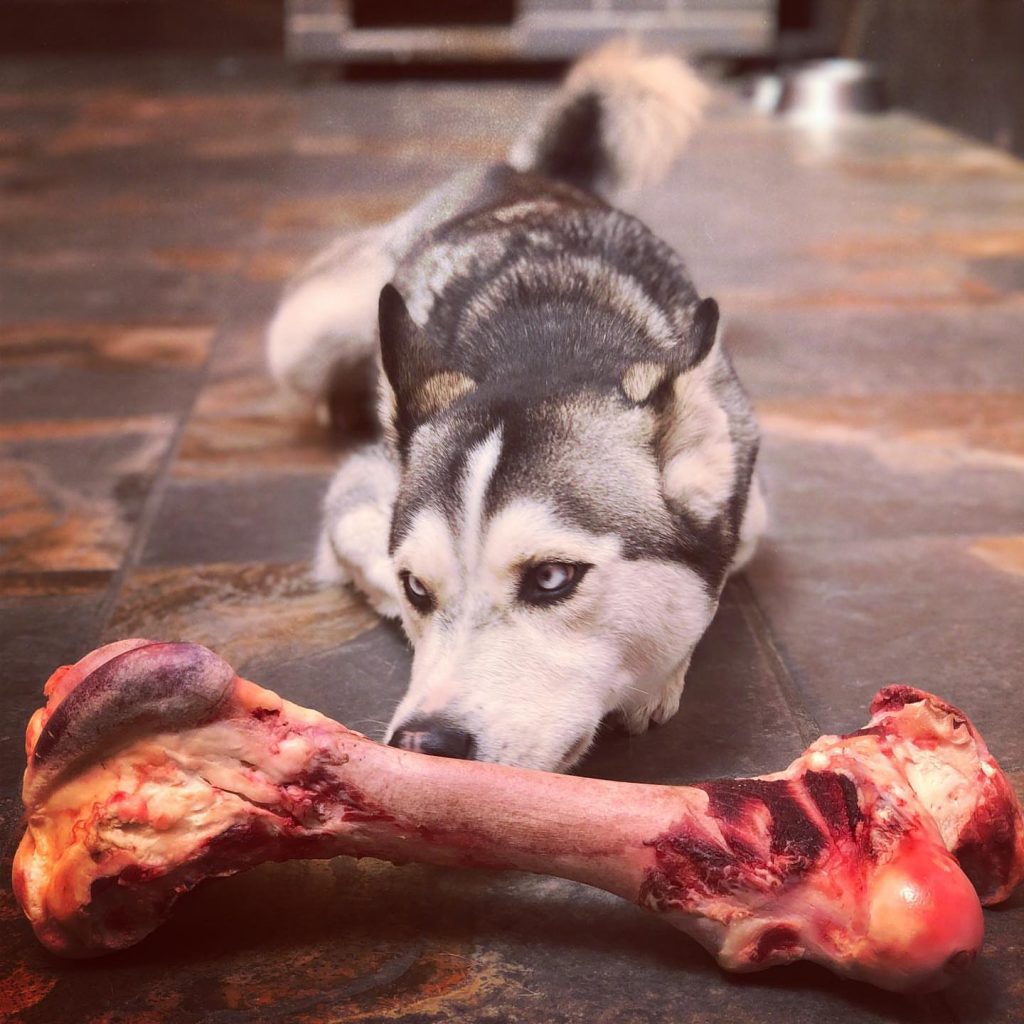
Husky and Bone.
Bone size: Opt for large, thick bones rather than small or narrow bones. Dogs are less likely to chew down large bones into shards and smaller pieces they can swallow.
Existing digestive problems: If your dog suffers from digestive issues, such as irritable bowel syndrome (IBS) or frequent diarrhea, it’s good to take all bones off the table. Bone marrow is extremely rich and can exacerbate these problems.
You may like: blue Boston terriers
Beef bones
One of the most frequent questions is, “can dogs eat beef rib bones?” Yes, as long as they’re large.
Chicken bones
Can dogs eat cooked chicken bones (or raw, for that matter)? The consensus on chicken bones of any kind is a resounding NO. Why? Chicken bones, especially when cooked, easily break and splinter. This can cause your dog to choke from bones getting caught in their throat.
Turkey bones.
Turkey bones splinter easily like chicken bones. So, feeding turkey bones of any kind (raw or cooked) is not recommended.
You may like: Why does my husky has diarrhea?
Pork bones.
Like chicken bones, veterinary experts typically agree that pork bones aren’t safe, whether they’re cooked or raw. This includes pork ribs, ham bones, and pork chop bones. The adverse health effects can be the same as with chicken bones.
Lamb bones.
Lamb bones are more similar to beef bones in their density. So, follow the same rules as for beef bones. Raw is better but cooked is okay if the lamb bone is large and thick.
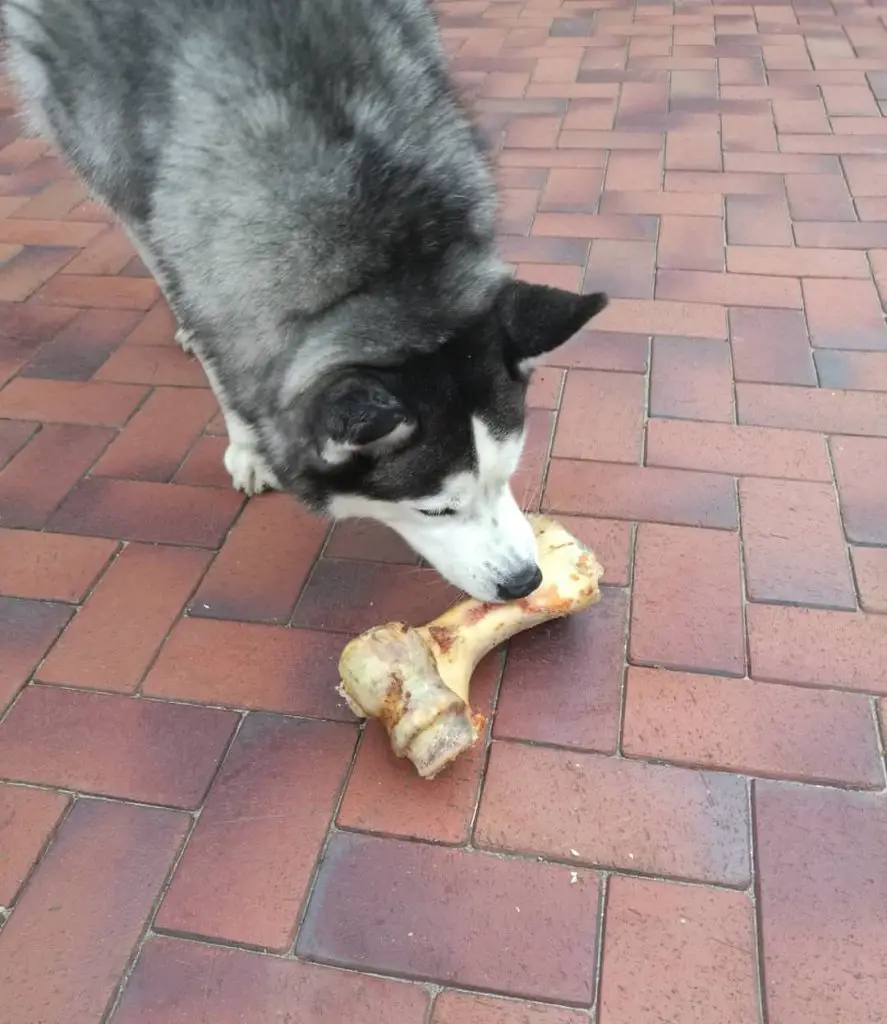
There are a few things to keep in mind
First, it’s important to make sure that the bone is not too small. There is a risk that your husky could choke on it if it is.
Second, you’ll want to avoid giving your husky bones that have been cooked. This is because cooked bones can splinter and cause choking or other gastrointestinal problems.
Finally, it’s always a good idea to supervise your husky while they are chewing on a bone. This way, you can make sure that your Husky doesn’t choke on the bone or swallow any large pieces that could obstruct the digestive tract.
You may like: can huskies eat raw eggs?
What are the health benefits of bones for Husky?
Chewing on bones can provide essential nutrients, such as calcium and phosphorus, important for strong teeth and bones.
Chewing on bones can also help keep your Husky’s gums healthy. In addition, chewing on bones can help relieve boredom and provide mental stimulation.
So, if you’re looking for a healthy snack for your husky, a bone may be a good option. Just be sure to choose the right type of bone and supervise your husky while he or she is chewing on it.
What bones you should never give your Husky?
Bones can be beneficial to your Husky when they’re the correct ones. If you do not choose the right bone, it could result in negative and even fatal consequences. The type of bone you should not give to your Husky is those cooked.
Most dog owners will consume at least one kind of meat to eat during dinner. This could be pork, steak or chicken. Once they’ve finished eating, they’ll give the remaining bones at their pet as treats. While this might seem like an appropriate thing to do however it’s not recommended.
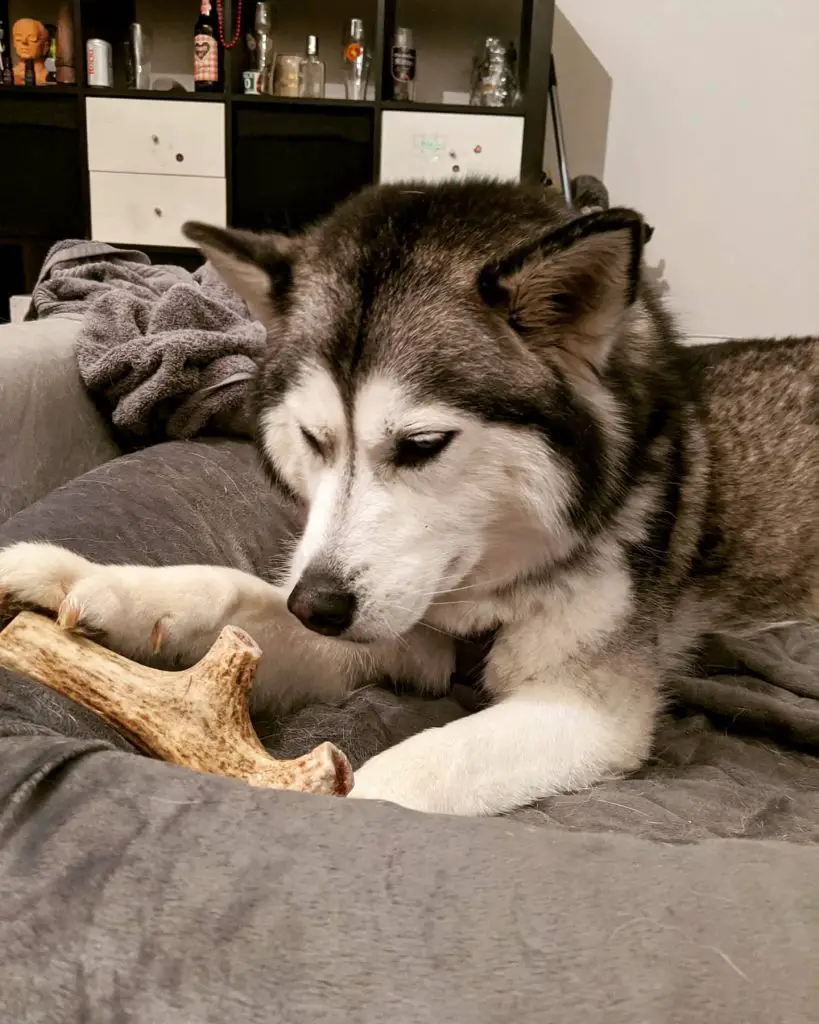
Cooked bones.
Bones cooked extremely dangerous for Huskies. After a bone is cooked, it becomes tough, brittle, and easy to break or split. This can be risky for a husky who is simply seeking to chew.
When a Husky chews on the bone, it could cut off and swallow sharp, small pieces that do not just cut their pet’s mouth but cause serious organ damage like the esophagus, stomach, or intestines.
It could be fatal to your Husky. It’s difficult to determine if that something similar has occurred until it is too late since it’s not obvious to the naked eye.
Another risk associated when you give to your Husky prepared bones, is that they may fracture teeth. Bones that are cooked aren’t as tough as ones that weren’t cooked. Even if your Husky does not break off chunks of bone, they could fracture teeth due to the strength the bone becomes.
Don’t offer the Husky tiny bones. Husky breeds are bigger, making it easier to choke them on small things. You must ensure that the bone you provide your pet, whether it’s safe, isn’t enough to allow your Husky to bite into. As a rule of thumb, the bone should be about the same size or larger than you can imagine the size of your Husky.
Since Huskies are bigger dogs and have a higher metabolism, it is best to avoid feeding them chicken bones. Chicken bones are smaller, which creates the risk of choking on behalf of your Husky. This is why they are risky, no matter if they’ve been cooked not.
You may like: why do chihuahuas shake?
Bones safe for your Husky.
Although certain bones may be risky, they’re not all dangerous. In fact, bones that are safe could have benefits for health. The problem is determining which bones have been proven safe and which aren’t. Below is the checklist of the bones suitable for your Husky.
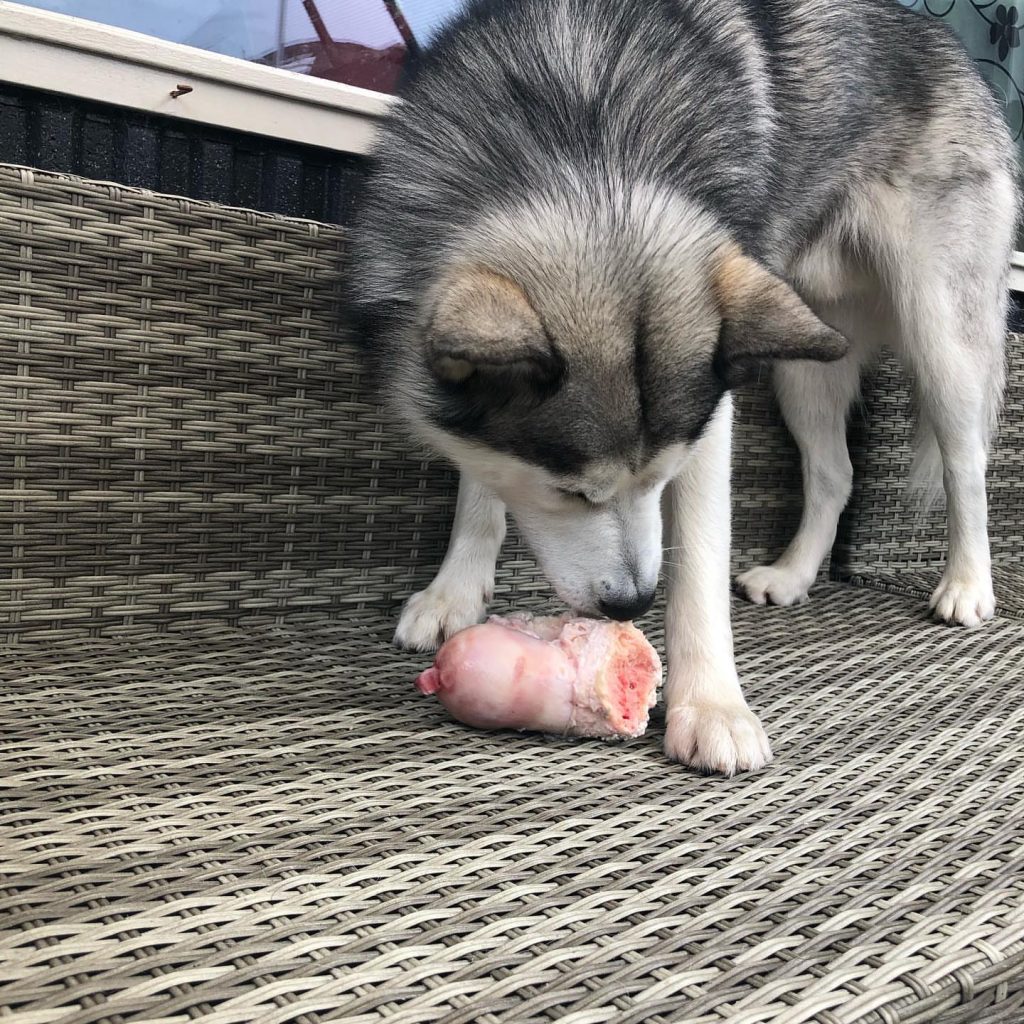
Bones in Raw bones.
Raw bones are much more secure and healthier for you, Husky. When bones of meat are cooked, they are a more rubbery texture, which causes them to be flexible, not snapping and breaking.
This way, you can ensure that they are more durable when Huskies chews them. If they do break the bone, they don’t usually have the sharp edges that cooked bones would, so there is less chance of puncturing or scraping.
Manufactured bones.
The pet stores usually offer bones that are specifically designed for dogs. So long as they’re sufficient in size to not be swallowed the bones, they are suitable and suitable for you, Husky.
Be sure to purchase the ones marked for large dogs. Sometimes, they will be flavored or contain snacks in the middle for your dog to love and build towards.
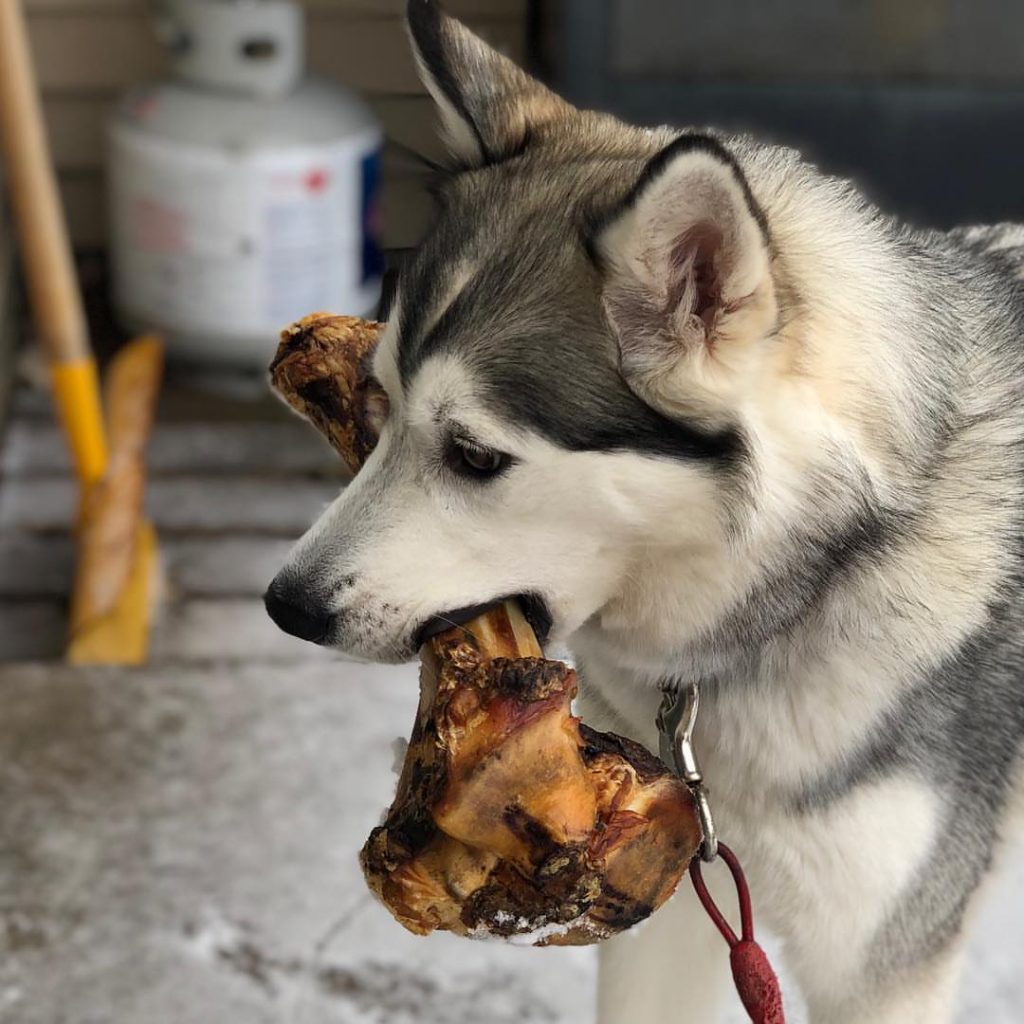
Rawhide bones.
Rawhide bones can be found at almost any pet shop. They are made of basically tough leather. They are incredibly soft and suitable to your Husky to eat and are frequently presented as treats.
My personal experiences with my dog are known to be somewhat messy and dirty; however, they’re entirely secure for your Husky.
You may like: Rottweiler bite force.
Antlers.
Many pet stores offer deer antlers for sale to chew on for dogs. It’s also a safe kind of bone for your Husky. Antlers are also loaded with nutrients that are located in the middle. They can be very beneficial to your Husky.
While these bones ought to be safe, be on guard with your Husky. Many things could happen, so make vigilant to prevent them from hurting or choking themselves.
At what age to give Husky bones?
While bones can be beneficial to adult Huskies, they are not always the best choice for a young Husky and should be offered to Husky puppy puppies under extreme care; however, it is preferable not to give them in any way.
Your Husky’s suggested level of age is 8 months up to 12 months before giving them bones. An excellent way to determine if your Husky is at the right age is the time they’ve got all of the adult teeth. The teeth of puppies are fragile and small that could easily fracture if they bite too hard on a hard bone.
They don’t have the same maturity, physical or mentally, making choke hazards much more dangerous. Puppies will typically eat anything they get their hands on, including bones.
It’s common for your dog to enjoy chewing on objects, particularly during teething; however, a bone isn’t the best choice for them. Consider giving them more secure options, like chew toys or soft toys.
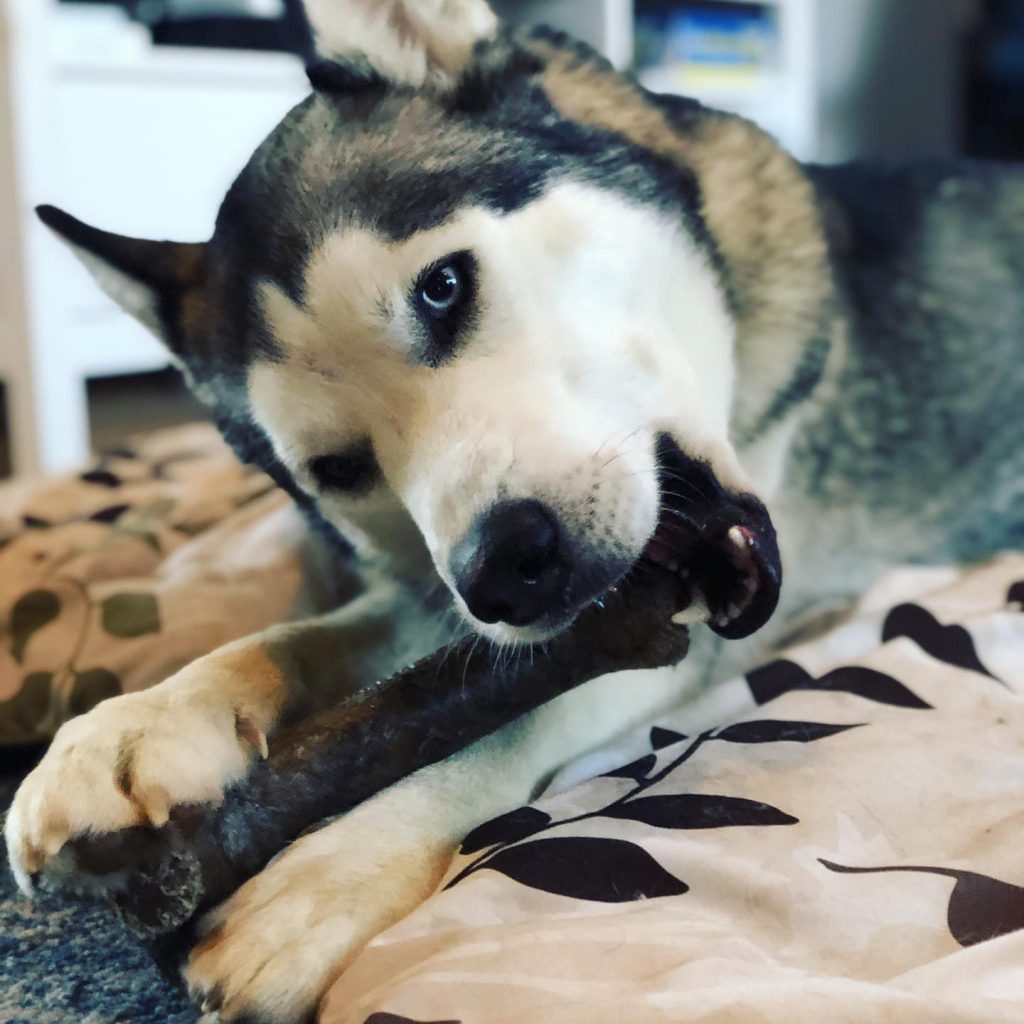
Conclusion.
While there are some risks associated with giving your Husky bones, there are many benefits. As long as you’re attentive and select the right kind of bone, your Husky will be able to enjoy the taste and health benefits that come with it.
Remember never to give them chicken bones and make sure they’re a good size for your husky. If you have any questions or concerns, please consult with your veterinarian.


